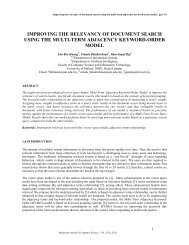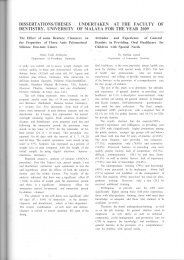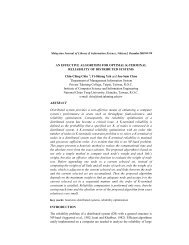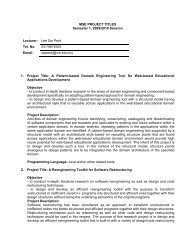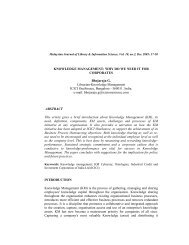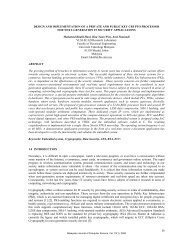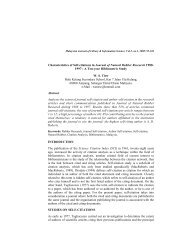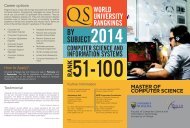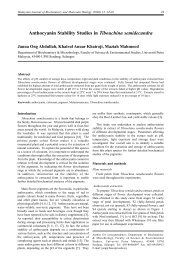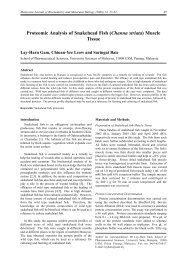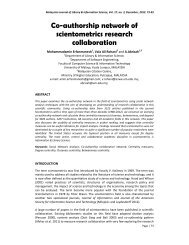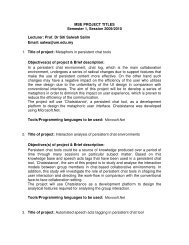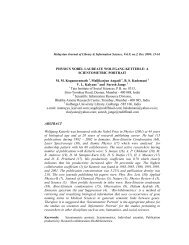Babalhavaeji, F. & Jafarzadeh Kermani, Z.theories on this subject (Willem 2003) and the intangible nature of knowledge (Jain et al.2007) more research needs to be done on this important resource.A number of organisations have adapted and applied formal knowledge management overthe past decade as practitioners and academics have identified effective knowledgemanagement as a crucial factor for success in higher education (Aulawi et al. 2009; Kim andJu 2008). Within the overall knowledge management domain, a critical area that needsmore attention is knowledge sharing. Effective knowledge management strategies mustemphasise the role of knowledge sharing to achieve maximum results for academicinstitutions. Knowledge sharing is considered as the most important process in knowledgemanagement and it seems necessary for academic institutions to do more research on it.As faculty members play an important role in higher education (doing research, publishing,teaching, providing consultation and conducting other professional activities) identifyingfactors influencing their knowledge sharing behaviour was considered in this study.In this paper the knowledge sharing factors that are focused on include attitude, intentionand intrinsic motivation. Also the role of types of institution and educators' length ofteaching experiences on knowledge sharing behaviour are further analysed. This studypositions the knowledge sharing behaviour in term of sharing knowledge in the areas of:a) teaching (which includes teaching materials, teaching methodology, experiencesand knowledge);b) doing research (which includes collaborative books, collaborative articles,collaborative research projects and making colleagues aware of research needs);andc) conducting professional activities (includes educators' membership in professionalassociations, their membership in journal editorial committees and theirparticipation in reviewing journals articles).LITERATURE REVIEWResearch concerning the factors affecting knowledge sharing has identified a number ofdifferent variables, from "hard" issues such as technologies and tools (Van den Hoof andDe Ridder 2004; Kim and Lee 2005; Chennamaneni 2006) to "soft" issues such asmotivation (Ardichvili, Page and Wentling 2003; Hinds and Pfeiffer 2003; Cheng, Ho andLau 2009; Taylor and Murthy 2009) and trust (Gao 2004; Aulawi et al. 2009; Choi, Kang andLee 2008). This review presents the empirical literature that studied factors influencingknowledge sharing behaviour in organisations and academic institutions in general, andthe literature which focused on attitude, intention and intrinsic motivation in particular.Osterloh and Frey (2000) asserted that effective knowledge creation and transfer is closelyrelated to motivation management. They analyzed various organisational and motivationaldevices with respect to their suitability to generate and transfer knowledge. In doing so,they noted that certain organisational forms have the capacity to crowd out intrinsicmotivation and therefore are detrimental to the effective transfer of knowledge.Lin and Lee (2004) investigated the applicability of the Theory of Planned Behaviour inexplaining senior managers' intentions to encourage knowledge sharing. The analyticalresults demonstrated that the main determinants of actual company knowledge sharingbehaviour were the encouraging intentions of senior managers. Additionally, seniormanagers' attitudes (correlation value=0.43), subjective norms (0.45) and perceivedPage | 2
Knowledge Sharing Behaviour Influences: a Case of LIS Facultiesbehavioural control (0.22) were found to positively influence intentions to encourageknowledge sharing.Bock, Kim and Lee (2005) examined factors that are believed to influence individuals'knowledge-sharing intentions. They employed the Theory of Reasoned Action andaugment it with extrinsic motivators, social-psychological forces and organisational climatefactor that are believed to influence individuals' knowledge sharing intentions. Theresearchers also found that the attitude towards knowledge sharing (correlation value=0.232) and subjective norms (0.266) influence individual’s intention to engage inknowledge sharing behaviour, along with organisational climate (0.142)Wasko and Faraj (2005) examined why individuals in electronic networks of practicecontribute knowledge to others, primarily strangers, when the contributor does not haveany immediate benefits and free-riders are able to acquire the same knowledge aseveryone else. The results of their study indicated that individuals contribute theirknowledge when they believe that participation enhances the professional reputation,when they have necessary expertise to share and when they become part of the structuralnetwork. An interesting finding of this study was that individuals contribute regardless ofexpectations of reciprocity or high levels of commitment to the network.By integrating a motivational perspective into the Theory of Reasoned Action, Lin (2007)examined the role of both extrinsic (expected organisational rewards and reciprocalbenefits) and intrinsic (knowledge self-efficacy and enjoyment in helping others)motivators in explaining employee knowledge sharing intentions. The results showed thatmotivational factors such as reciprocal benefits (correlation value= 0.35), knowledge selfefficacy(0.27), and enjoyment in helping others (0.21) were significantly associated withemployee knowledge sharing attitudes. Also the result confirmed that reciprocal benefits(correlation value= 0.25), knowledge self-efficacy (0.42), and enjoyment in helping others(0.24) positively influence employee knowledge sharing intentions. However, expectedorganisational rewards did not significantly influence employee attitudes and behaviourintentions regarding knowledge sharing.Research on knowledge sharing in higher education institutions has been considered bysome researchers. Lou, Yang and Shih (2007) studied the behaviour of instructors frominformation management departments with regard to knowledge sharing at technologicaluniversities. The influence of self-motivation and incentive mechanism on instructors’individual knowledge sharing and the obstacles encountered while knowledge sharingwere investigated in this study. The results showed that information managementinstructors may encounter some barriers when sharing knowledge with others; theyshowed negative consensus on issues such as individual job security, academic promotionand intellectual property rights, making colleagues unwilling to share knowledge; therelationship among colleagues is very distant; and department heads do not takeknowledge sharing seriously. Among the positive consensus items are: instructors agreedthat the research workload is too heavy to share knowledge with others; and theuniversity’s information software that facilitate knowledge sharing is too old to use. Inaddition, the four aspects of knowledge sharing between instructors such as (a) thebehaviour of instructors’ knowledge sharing in teaching, research, educational and studentcounseling; (b) the motives of instructors’ knowledge sharing; (c) the incentives ofinstructors’ knowledge sharing; and (d) the situations of instructors’ knowledge sharingwere correlated with their demographic moderators which include gender, seniority ofteaching, marital status, educational background, type of institute, institute location,Page | 3



